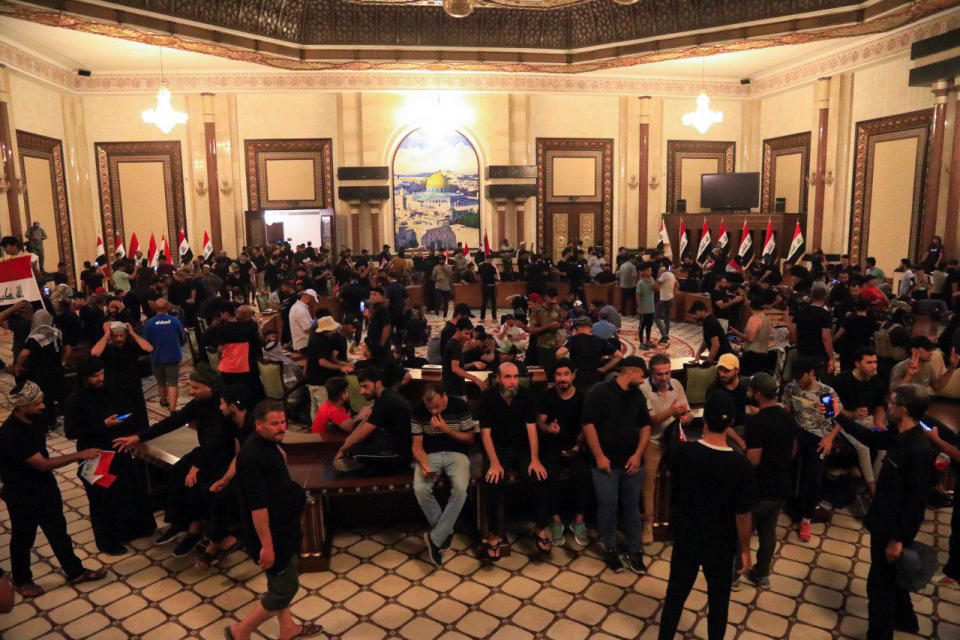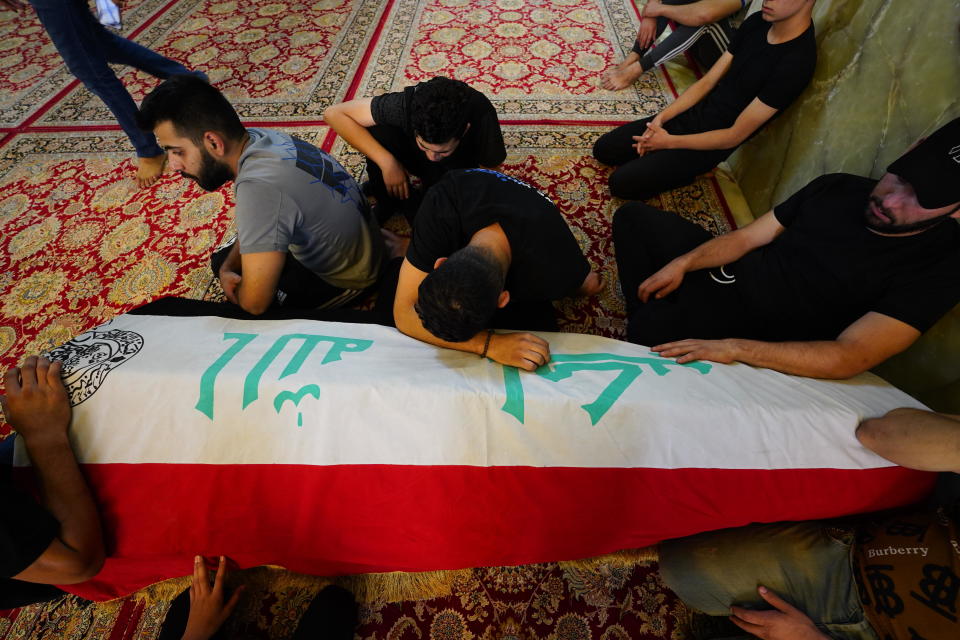Will Iraq be the next Afghanistan?
- Oops!Something went wrong.Please try again later.
Violent clashes between rival factions within Iraq's majority Shiite Muslim community left 23 people dead and hundreds more wounded this week. The mayhem ended abruptly when powerful Shiite cleric Muqtada al-Sadr ordered his followers to withdraw from locations they'd occupied in Baghdad and elsewhere, and to go home.
But while al-Sadr's command defused the deadly standoff between his backers and rival Shiite factions considered allies, if not proxies, of neighboring Iran, the underlying rift remains. Iraqis know that if it's not mended, the violence could easily erupt again, and escalate into a wider conflict.

"It was a terrifying 24 hours, we could hear bullets hitting walls and cars around our apartment," Ahmad Abdullah told CBS News. Abdulla, 36, lives with his wife and two daughters less than a mile from the heavily fortified "Green Zone" in Baghdad, where much of the government is based and which is often the focal point of unrest.
He compared the situation to the civil war that tore Iraq apart between 2003, when the U.S. invaded to topple Saddam Hussein, and 2008.
Why did it happen?
The clashes didn't take many Iraqis by surprise. The country has been mired in political turbulence since the last national elections in October 2021.

Al-Sadr's nationalist political movement, which opposes both Iran's and the West's influence in Iraq, won the most parliamentary seats in the voting, securing 73 of the total 329.
But they fell short of the two-thirds majority of seats required to form a new government unilaterally. Al-Sadr and his senior aides refused to negotiate a power-sharing unity government with the rival "Coordination Framework," an alliance of mostly Iran-aligned Shiite parties.
Al-Sadr dismissed the Framework's politicians as corrupt proxies of Iran. But without cooperation from its factions — including the State of Law parliamentary bloc led by two-term former Prime Minister Nouri al-Maliki — al-Sadr couldn't form a new government.
Iraq has been run by a "caretaker government" since 2020, even before the elections last year failed to establish a new administration.
Al-Sadr tried many times to form a government, but with the deadlock persisting, in June he told all 73 of his bloc's Members of Parliament to resign in protest. He gave his supporters a green light to occupy the parliament and block the next session of the legislature, and then said the parliament should be dissolved and new elections held.

On Monday, al-Sadr went a step further and announced his resignation from politics — not for the first time. His followers took it as a battle cry, marching from the parliament they'd occupied for days toward other governmental buildings, including a presidential palace that hosts meetings for heads of state and foreign dignitaries.
They kept marching toward houses and offices of al-Sadr's rivals, and that's when it got ugly. Militias the al-Sadrists say are backed by Iran started confronting them. It escalated quickly, and soon small arms, drones and even mortars were fired.
The chaotic scenes were reminiscent of Iraq's civil war and the sectarian violence that followed the U.S. invasion in 2003. It intensified when the al-Sadr movement's military wing joined his supporters in the melee.

By the time the cleric told his backers to go home, almost two dozen people were dead in Baghdad and other Shiite-majority cities in southern Iraq.
Who's Muqtada al-Sadr?
Al-Sadr has long been one of Iraq's most influential Shiite clerics, as was his late father, from whom he inherited a large following.
Unlike many other Shiite leaders in the country, al-Sadr opposed the U.S. invasion in 2003 from the very first day. Soon after U.S. troops arrived, he declared war on them, and it was his militia that claimed many of the U.S. lives lost during the conflict.
Many Iraqis saw al-Sadr as a commander doing what their national leaders would not — standing up to a foreign invader — and the war gave his domestic popularity and nationalistic image a huge boost.
By 2007, al-Sadr was seen as a serious threat to the U.S. military and the Iraqi administration it backed. So, the U.S. helped usher Nouri al-Maliki into the presidency, vowing to help him take on al-Sadr and his militia.
It was the birth of the enmity between two of Iraq's most powerful Shiite leaders.
Prospects for peace, or war
Al-Maliki and his Al-Dawa Party remain the second most powerful Shiite faction in Iraq, after al-Sadr's.
An audio clip of al-Maliki speaking, which was leaked recently to Iraqi media, confirms that he has connections with Iran's powerful Revolutionary Guard, which will only bolster the contempt for him among al-Sadr's loyal supporters.
CBS News spoke with many Iraqi politicians who suggested that the division within the country's huge Shiite population — between the al-Sadrists and al-Maliki's supporters — has now reached a point of no return.

If they can't agree to work together for the greater good of the country, few see much reason to hope for a stable government in the near future.
"It might look like the two groups are fighting for their election rights and constitutional deadlines, but make no mistake, neither one of them care about democracy and laws," political analyst Rostam Mahmood told CBS News.
Sources told CBS News on Wednesday that Iraq's Supreme Court would consider the al-Sadr movement's request to formally dissolve the parliament and order new elections, indicating at least some effort to ease the tension that sparked this week's violence.
But Mahmood wasn't optimistic about a lasting solution.
"Post-invasion Iraq is now run by groups and leaders that believe in completely different values than a democratic society," Mahmood said. "The idea of parachuting democracy into Iraq didn't work. Just like Afghanistan, Iraq is another failed state, and the country will fall into the wrong hands in the end."
From 1997: The life and death of Princess Diana, hounded by paparazzi
Thousands in Mississippi lack clean water as governor says emergency repairs underway
Justice Department alleges "obstructive conduct" took place at Mar-a-Lago

